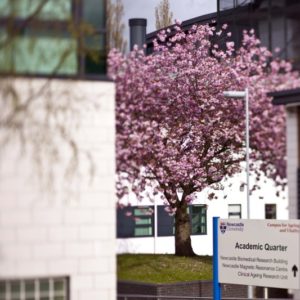
Staff at NTW have been closely involved with a new report from the Royal College of Psychiatrists (RCPsych) which sets out recommendations for providing good quality services for people living with young-onset dementia (YOD).
Young-onset dementia (also known as early-onset dementia) refers to any variant of dementia which affects someone who is less than 65 years of age.
The report was published in October 2018 and is endorsed by RCPsych, Alzheimer’s Society, Young Dementia Network and the Royal College of General Practitioners. Its production involved wide collaboration between psychiatrists, GPs, neurologists, dementia researchers and patients living with YOD.
The RCPsych report’s recommendations for NHS Trusts include putting the patient with YOD and their family at the centre of the service, providing a specialised service for YOD with expertise in offering assessment and treatment alongside support, and actively supporting YOD research.
The working group that collaborated on the report was chaired by NTW consultant psychiatrist Dr Bob Barber. Two additional NTW consultants contributed to the report: consultant neuropsychiatrist Dr Suresh Komati, and Dr Stuart McKirdy, a consultant old age psychiatrist who is the clinical lead for YOD in Newcastle.
Dedicated, specialist services for people diagnosed with young-onset dementia are still the exception rather than the rule. We should, therefore, be incredibly proud that NTW has a team in Newcastle to support people living with YOD.
When people think about dementia they often don’t realise it can affect younger people. The new college report is fantastic as it advises organisations how best to provide services for people living with YOD.
The needs of people with YOD are often very different from those diagnosed with dementia in later life. A different approach is often required and so a specialist team is recommended for this reason.
Dr Stuart McKirdyConsultant old age psychiatrist and clinical lead for YOD in Newcastle
Dementia is the name for a varied collection of symptoms that suggest a person’s brain is struggling to do all the tasks it usually does in everyday life. Every person with dementia is different but things such as a person’s memory, co-ordination or personality can all be affected.
There are estimated to be approximately 42,000 younger people living with dementia in the UK: 5% of all those with dementia. Most people living with YOD are in their 50s and 60s but YOD can affect people in their 40s.
YOD can be caused by similar diseases as dementia in later life such as Alzheimer’s disease and vascular dementia. However, rarer forms of dementia are more common in patients with YOD.
NTW offers a dedicated community-based service working with people under 65 with a diagnosis of certain types of dementia. The team was set up in 1997 and is one of the first services in the country to specifically focus on working with people living with YOD.
The YOD team is based at the Campus for Ageing and Vitality (formally Newcastle General). Dr McKirdy works with a dedicated community psychiatric nurse (CPN) and a senior trainee psychiatrist with additional input from occupational therapists, psychologists and support workers.
The support available for people living with YOD can include counselling and information to develop strategies to help maintain their mental health, support and education from other professionals including social workers, district nurses, voluntary services or day centres, as well as practical measures such as advice about benefits and household budgeting.
The needs of a younger person when receiving a diagnosis of dementia are different to those of an older person. The impact of the diagnosis can be much greater. The person may still be working with financial commitments such as paying a mortgage. There may also be young children to support and dependant parents.
Families in the past have said the support from the Younger Persons team was crucial and key to adjusting to a dementia diagnosis and allowing the person and family to live a “normal” life and continue to function with the appropriate support signposted by the team. The knowledge of the available pathways for the person and the team liaising with other agencies has allowed timely and appropriate interventions.
Carol RaineCPN for the Newcastle YOD team
Many of the report’s detailed recommendations are already in place at NTW such as offering a specialist service for YOD where the patient is at the centre of the team, playing an active role within a local clinical network (which includes neurology, neuropsychiatry and genetics) and collaborating with local research networks.
NTW is closely linked to research networks in the North East and is collaborating on a number of research projects. There is also a local YOD network with neighbouring NHS Trusts; Gateshead Health NHS Foundation Trust, Northumbria Healthcare NHS Foundation Trust and Tees, Esk and Wear Valleys Foundation NHS Trust.
If you are concerned about your memory it is recommended that you speak to your GP in the first instance who will work with you to address your concerns.
The full RCPsych guidelines on Young Onset Dementia can be accessed via the RCPsych website.
More information on Young Onset Dementia is available on the Alzheimer’s Society website
Support in Newcastle is also available from the Dementia Advice Centre
You can follow Dr Stuart McKirdy on Twitter @drstuartmckirdy.
